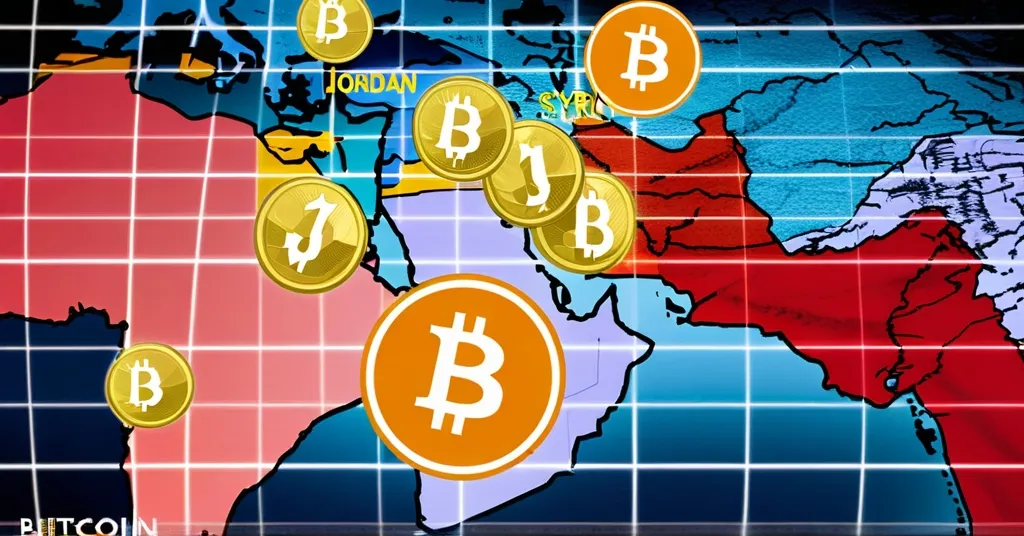Jordan and Syria Turn to Blockchain and Bitcoin for Economic Revival

Jordan and Syria Embrace Blockchain for Economic Transformation
In a groundbreaking move, Jordan and Syria are turning to blockchain and Bitcoin to revolutionize their economies. Jordan plans to integrate blockchain technology into its government operations, aiming to enhance efficiency and economic growth, while Syria’s Syrian Center for Economic Research (SCER) proposes the legalization of Bitcoin to revive its economy.
- Jordan implements blockchain for government efficiency.
- Syria proposes Bitcoin legalization for economic revival.
- Both moves aim to enhance transparency and economic growth.
Jordan isn’t just blockchain-curious; it’s blockchain-committed. The Jordanian Council of Ministers has approved a policy to use blockchain as the backbone for public services, a move aimed at slashing bureaucracy and increasing transparency. This initiative could save the government up to $5 billion by preventing fraud, streamlining blockchain-based elections, and improving supply chain efficiencies. Blockchain, a secure, digital ledger of transactions, is expected to revolutionize how public services are delivered, making government operations leaner and more transparent.
To ensure the success of this transformation, Jordan is also investing in education. The government is preparing to train its civil servants in Web3 technologies (the next generation of the internet) and introduce these cutting-edge technologies into schools and universities. This forward-thinking approach aims to prepare the next generation for a decentralized future, where digital identity systems and smart contracts (self-executing contracts with the terms directly written into code) could become commonplace.
Meanwhile, over in Syria, the SCER is pushing for the legalization of Bitcoin and other digital assets to breathe new life into its struggling economy. Their vision includes a digital economy powered by decentralized banking and a Central Bank Digital Currency (CBDC) backed by liquid hard assets like Bitcoin or gold. The SCER emphasizes that this initiative is not meant to circumvent international sanctions but to push for their urgent lifting through legal and political processes. As they stated:
“We also emphasize that this is NOT meant to circumvent international sanctions. We believe that sanctions should be lifted URGENTLY through legal and political processes in accordance with international law.”
These moves by Jordan and Syria are part of a broader trend in the Middle East, where countries are increasingly adopting blockchain and digital assets to modernize their economies and governance systems. Saudi Arabia and the United Arab Emirates (UAE) are also jumping on the blockchain bandwagon, with robust regulatory frameworks in place to attract global Web3 companies. Iran and Bahrain, while exploring CBDCs, remain cautious about fully legalizing digital assets for commerce. This regional shift towards embracing blockchain technology positions the Middle East as a potential leader in the global adoption of Web3 technologies.
However, this promising path comes with challenges to overcome. Regulatory hurdles, security concerns, and the need for widespread adoption are significant obstacles that must be addressed. Skepticism from traditional financial sectors and technical hurdles in implementing these technologies could slow down progress. Yet, the potential benefits of increased transparency, reduced costs, and economic growth are driving these nations forward.
The economic situations in both Jordan and Syria highlight the significance of these initiatives. Jordan seeks to streamline its government operations and spur economic growth, while Syria aims to recover from its war-torn economy through digital assets. Successful blockchain implementations in other countries, such as Estonia’s e-governance system, provide practical examples of how these technologies can transform governance and economic outcomes.
Looking ahead, these policies could attract international investment and foster innovation hubs in the region. Jordan and Syria’s commitment to blockchain and digital assets could set a precedent for other nations, encouraging a global shift towards decentralized technologies.
As we watch these developments unfold, it’s clear that the Middle East is not just following the blockchain trend—it’s setting the pace. For enthusiasts and skeptics alike, it’s a fascinating time to be part of the crypto conversation, where the future of money and governance is being rewritten, one block at a time.
Key Questions and Takeaways
What is Jordan’s plan regarding blockchain technology?
Jordan aims to implement blockchain technology across government operations to enhance efficiency, increase transparency, and drive economic growth. The policy has been approved by the Jordanian Council of Ministers.
How much could Jordan save by integrating blockchain into government processes?
Experts estimate that Jordan could save up to $5 billion in government spending through blockchain integration, primarily from fraud prevention, blockchain-based elections, and improved supply chain efficiencies.
What is the Syrian Center for Economic Research (SCER) proposing?
The SCER is proposing the legalization of Bitcoin and other digital assets in Syria to revive its economy. They advocate for a digital economy, decentralized banking, and a CBDC backed by liquid hard assets like Bitcoin or gold.
How does the SCER’s proposal address international sanctions?
The SCER clarifies that their recommendations are not intended to circumvent international sanctions but rather to push for their urgent lifting through legal and political processes.
How are other Gulf countries approaching blockchain technology?
Other Gulf countries like Saudi Arabia and the UAE are adopting blockchain with robust regulations, attracting global Web3 companies. Iran and Bahrain are exploring CBDCs but remain cautious about legalizing digital assets for commerce.
What is the broader significance of these developments in the Middle East?
These developments signal a regional shift towards embracing blockchain and digital assets to modernize economies and governance systems, positioning the Middle East as a potential leader in the global adoption of Web3 technologies.



